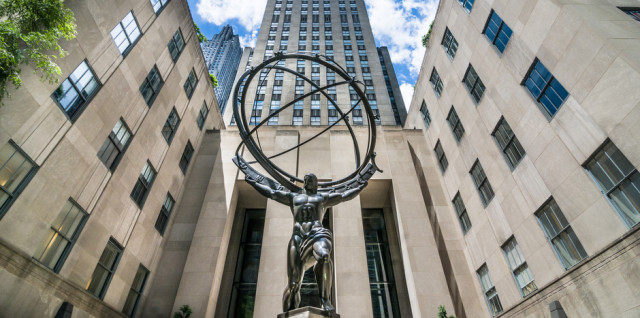In the wake of two recessions following two fleeting, largely service-sector bubbles—the dot-com bubble and the housing/financial bubble—America’s intellectual and political leaders are championing the need for industrial progress.
The ubiquitous Thomas L. Friedman takes on the subject of industrial progress in his latest book, That Used to Be Us, coauthored by political scientist Michael Mandelbaum. The book begins by describing a China full of fast trains, stupendous buildings, and an aura of dynamism—and contrasting it to an America in which repairing a subway is a multi-year project. Such images resonate with readers and voters, who wonder with frustration why so much industrial innovation, production, and job-creation is happening overseas rather than in America.
In President Obama’s recent address on jobs, he angrily complained about the state of American industry:
Our highways are clogged with traffic. Our skies are the most congested in the world. It’s an outrage.
Building a world-class transportation system is part of what made us an economic superpower. And now we’re going to sit back and watch China build newer airports and faster railroads?
Obama is right about this much; the state of American industry is an outrage. America has enormous, incalculable, untapped potential to make industrial progress—to radically increase our standard of living through far greater productivity in energy production, in manufacturing, in construction, in mining, in transportation. Unfortunately, the statist philosophy of Obama, Friedman, et al leads them to speciously attribute the problem to lack of government—despite the unprecedented expansion of government over the last 50 years. They propose still more increases in government spending and controls, as if some magic manipulation is going to spark the next industrial revolution.
At the same time, they ignore the most blatant impediment to industrial progress—an impediment caused by policies they support. This impediment is an open secret readily discoverable by asking American industrialists what is holding them back.
When I do this, I hear one theme repeated over and over: it is ruinously difficult to start new industrial projects because of our anti-industrial, “green” policies.
Consider the plight of the modern industrialist. Whether he wishes to construct a new apartment complex, open a coal mine, site a nuclear power plant, build a new factory, drill for oil, he cannot count on clear, objective laws to protect his right to develop. Instead, he must deal with open-ended environmental laws and near-omnipotent regulatory agencies that can forbid any project that is regarded as insufficiently “green.”
The industrialist is virtually guaranteed to face a labyrinth of opposition by environmental bureaucrats, controls, lawsuits, NIMBYs, and activist groups. Every step of the labyrinth costs time and money, and there is no guarantee a project will emerge alive; vital industrial projects can and have been shut down to preserve the likes of kangaroo rats and two-toed sloths.
Given this industrial climate, it is a wonder that any industrial development occurs in this country. Ask any leader of an industrial project how much opposition he faces in refining the fuel we use to drive, in fracking for the gas that heats our homes, in building the coal or nuclear plants that keep the power on, and you will marvel at the inhuman endurance our industrialists possess—an endurance we can’t, and shouldn’t have to, count on.
The “green” labyrinth goes far beyond traditional environmentalist targets such as coal and oil. The DC Metro subway system that Friedman and Mandelbaum complain about has been enmeshed in controversy for years over adding a new “Purple Line” to its system, with rabid opposition. Any proposed new road in California, the home of some of the country’s worst traffic, faces an uphill, if not impossible, battle.
Even allegedly “green” solar and wind projects frequently face environmentalist opposition. Environmentalist Robert F. Kennedy Jr. is the biggest opponent of Cape Wind, a windmill project off the coast of Nantucket. Environmentalists were the first to object to a giant solar project in the middle of the Mojave Desert in California.
What is so remarkable about the “green” opposition to industrial projects is that Americans, who supposedly want industrial progress, are so accepting of it. Based on the “green” movement’s actions, one might expect its goals and policies to be viewed with suspicion if not derision.
Instead, the idea of “going green” has never been more popular, with practically every businessman, schoolteacher, and politician trying to prove his “green” chops, in his personal life or at the ballot box. And thus, countless industrial projects continue to be deferred and destroyed.
If we are to make industrial progress, we need to seriously question the idea of “going green,” and its role in our government.
The “Green” Ideal
What does “green” really mean? It is most commonly associated with a lack of pollution and other environmental health hazards, but this is both far too narrow and highly misleading. Consider the range of actions that fall under the banner of “green.” As industrialists experience, it is considered “green” to object to crucial industrial projects, from power plants to dams to apartment complexes, on the grounds that some plant or animal will be impacted—plants and animals that take precedence over the human animals who need or want the projects.
It is considered “green” to oppose not only fossil fuel plants (which produce 86% of the world’s energy), but hydroelectric plants and nuclear plants—which all told means 98% of the world’s energy production. It is considered “green” to turn off the heat or air-conditioning, even at the price of personal discomfort.
It is considered “green” to do less of anything industrial—from driving to flying to using a washing machine to using disposable diapers to consuming pretty much any modern product (there is now an attack on iPhones for being insufficiently “green” given the various materials that must be mined to make them).
Often the same activity will be characterized as both “green” and non-“green”—just ask the proponents and opponents of any given solar farm. The proponents will say that the installation is “green” because it doesn’t use fossil fuels (except, they evade, to mine, fabricate, transport and assemble it), it isn’t mining the earth’s precious “natural resources” (except, they evade, for enormous amounts of steel, concrete, and various rare and toxic elements), etc. The opponents will point to the fact that solar farms, because they use a diffuse, intermittent energy source, take up an enormous “footprint” on nature, that they require prominent, long-distance transmission lines to take to their customers, that they require large-“footprint” backup systems to store energy or fossil fuel plants to serve as backups, etc.
Clearly, “going green” is not primarily about human health—indeed, in its opposition to just about anything industrial, it threatens the industrial foundations of modern health and sanitation. The essence of “going green,” the common denominator in all its various iterations, is the belief that humans should minimize their impact on nature.
“Green” leaders and followers may disagree on how to implement this ideal, and they certainly do not follow it consistently, but nevertheless it is uncontroversial that minimizing impact is the ideal.
But if we take ideas seriously, then the “green” ideal should be more than controversial. It should be jettisoned, as it is squarely opposed to the requirements of human life, including the requirements of a healthy human environment.
The Industrial Ideal
Human beings survive by transforming nature to meet our needs. The higher our level of survival, the more we must transform nature. In other words, we survive to the extent we depart from the “green” ideal.
Nature does not provide us with the wealth or the environment we need to live long, healthy, happy lives; hence the historical life expectancy of 30. To live and thrive, we must create wealth and create a livable environment. And every new act of creation, from building a fire to building an air-conditioned home to building the Internet, requires additional impacting—transforming—nature.
The fundamental reason for today’s incredibly high standard of living is that thanks to industrialization—the pervasive use of man-made power to fuel industrial machines—human beings can do hundreds of times more work to transform nature than we could even 200 years ago. But if our ancestors had followed “green” strictures, industrialization would have never got off the ground.
When the early oil industry turned night into day by making cheap illumination available to millions, they did it by drilling thousands of deep holes in rural Pennsylvania, extracting the black gold beneath, refining it into various useful substances, burning kerosene to create light, and dealing with whatever waste products emerged. J. J. Hill’s Great Northern Railway, a private transcontinental railroad that revolutionized American transportation and commerce, required men to mine iron ore from the ground, to combine it with carbon to make steel, to mine and use coal to power the steel furnace, to pour the mixture into molds, to use the molds to make railroad tracks, to lay the railroad tracks across patches of wilderness, to displace various plants and animals that stood in the way, and many more changes to the status quo.
Fast forwarding to today, the Chinese airports and buildings that many marvel at also transform nature on a massive scale—from the magnitude of the physical structures themselves to the coal plants, gas plants, factories, mining operations, oil rigs, oil refineries, and heavy machinery that went into building them, not to mention the industrial transportation system that keeps them maintained and stocked with supplies.
Industrial progress is not “green.” “Going industrial” requires a commitment to impacting nature as much as necessary to make it more hospitable to human life. And it is no accident that in generations past, Americans viewed industrial progress, not industrial abstention, as an ideal to strive for. Earlier generations took pride in transforming nature—in being a people that “tamed a continent,” that built new factories, that paved new roads, that drilled new wells, that mined the earth for resources. Whole towns would celebrate when a new bridge was built, when a factory was erected. They would proudly drive their automobiles, fly in planes, support new railroads, build new roads—without a shred of guilt over the fate of the two-toed sloth.
What about “green” support for “green energy” and a “green economy”? Is this not just a new, superior form of industry? Far from it. Any talk of green industry is ultimately contradictory, which is why such industries never materialize on a significant scale. All energy production requires an enormous amount of industrial development, both in its production and in its consumption.
Thus, environmentalists frequently oppose every power source, including solar and wind, for their various impacts. (They complain that solar and wind farms have the largest land “footprint” of any form of energy generation, which is true.) Similarly, for all the talk of “green construction,” “green building,” and “green jobs,” any activity with a major industrial presence will draw “green” opposition—as the valuable website www.projectnoproject.comaptly details.
The more consistent anti-industrialists are explicit about their goal, including its ultimate implication: de-development and depopulation. Stanford environmentalist celebrity Paul Ehrlich, who likens population growth to a “cancer,” “A massive campaign must be launched to de-develop the United States. De-development means bringing our economic system into line with the realities of ecology and the world resource situation.” Billionaire Ted Turner, a “mainstream” figure, says: “A total [world] population of 250-300 million people, a 95% decline from present levels, would be ideal.”
The true nature of “green” emerged particularly clearly in a debate over nuclear fusion in the late 1980s. Some uninformed news reports announced that fusion—which, if it worked, would be the cheapest, cleanest, most plentiful source of energy every created—was on its way to commercial reality. Many expected environmentalists to embrace this development. They condemned it.
“It’s the worst thing that could happen to our planet,” said leading environmentalist Jeremy Rifkin. Ehrlich memorably said that allowing human beings to use fusion was “like giving a machine gun to an idiot child.” Environmentalist icon Amory Lovins stresses he would oppose any fusion-like energy breakthrough: “Complex technology of any sort is an assault on human dignity. It would be little short of disastrous for us to discover a source of clean, cheap, abundant energy, because of what we might do with it.”
Do not make the mistake of writing off these anti-industrialists as “extremists” who don’t reflect on “moderate” greens. While the “extremists” are more consistent than the “moderates,” they share the same ideal—the anti-impact ideal that destroys industrial progress to whatever extent it is practiced.
But what about the “environmental impact” of industrial development? Isn’t the “green” movement providing a salutary influence us by helping us combat that problem? Again, no.
The idea of “environmental impact” is what philosopher Ayn Rand called an “intellectual package-deal.” Such a concept dishonestly packages together two very different things—the impact of development on the human environment and the impact of development on the non-human environment. Industrial development will certainly often harm various non-human environments—but it is a godsend to the human environment. By lumping together concern with the non-human environment (e.g., displacing some caribou to get billions of barrels of the lifeblood of civilization) and the human environment (e.g., air quality), anti-industrialists are able to dupe Americans into thinking that sacrificing to caribou somehow benefits them.
Historically, industrial progress brought with it a radical improvement of the human environment. Indeed, industrial progress essentially is the improvement of the human environment. The reason we develop is to make our surroundings better so that our lives are better, cleaner, healthier safer—in the face of a natural environment that is often hostile to human life.
Contrary to “green” mythology, man’s natural environment is neither clean nor safe. In a non- industrialized, “natural” state, men face all sorts of health dangers in the air and water, from the choking smoke of an open fire made using plant matter (a cause of over a million deaths a year to this day) to the feces-infested local brook that he must share with farm animals. Industrial development gives men the technology and tools to make their environment healthier—from sanitation systems to sturdier buildings to less onerous job conditions to comfortable furniture to having healthy, fresh food at one’s disposal year round, to the wealth and ability to preserve and travel to the most beautiful parts of nature. And so long as we embrace policies that protect property rights, including air and water rights, we protect industrial development and protect individuals from pollution.
As for the “sustainability” of industrial progress, an accusation that dates back to Marx, this fails to recognize the fact (elaborated on by Julian Simon and Ayn Rand) that man has an unlimited capacity to rearrange nature’s endless stockpile of raw materials into useful resources—which is why the more resources we use, the more resources we have.
Human life requires changing nature on a massive scale. Any cause that holds minimal impact as an ideal is anti-human and an enemy of the human environment.
Today’s anti-industrial movement is not new in this respect. Throughout history, there have been major, anti-industrial groups or movements. The basic premise they have in common is that it is arrogant and wrong for man to transform nature as he sees fit. Man, they believe, should not tame nature but exist in some sort of mystical “harmony” with it (how he is supposed to cope with nature’s dangers and a life expectancy of 30 is rarely specified). Perhaps the iconic anti-industrialist was the 18th Century’s Jean-Jacques Rousseau, who worshiped nature untouched by man and regarded the transformation of nature in his time (let alone the then-unimaginable transformation that is our modern world) as evil.
But the modern-day followers of Rousseau know they cannot succeed by being directly anti-industrial. So they create a false association between themselves and environmental progress, and a false opposition between industrial progress and environmental progress.
Part of this false conceptualization has been achieved by using an old socialist trick to obscure the massive environmental improvement that industrial capitalism brought. The trick is to criticize something by comparison to a nonexistent and impossible utopia.
Socialists used this technique to criticize capitalism for causing poverty, even though capitalism inherited poverty–and cured it. Yet Marxists would attack capitalism’s incredible contribution to human life, including to the life of laborers, by comparing that contribution, not to its predecessors and not to any known alternatives, but to a fictional socialist utopia whose advertised results contradicted everything known (even then) about socialism’s destructive nature.
Environmentalists have done the equivalent to industrial progress. Instead of comparing the human environment pre-industrial and post-industrial, they compared the post-industrial environment to a non-existent pollution-free utopia achieved by man living in “harmony” with nature. They did this in spite of conclusive historical evidence that living in “harmony” with nature means living very briefly. Historically, to the extent humans didn’t mine, didn’t burn fuels, didn’t develop, and were unwilling or unable to control or displace other species where necessary, they died early and often. The modern standard of living is an unprecedented, singular achievement that continues only so long as men are free to command nature on a large scale.
Early environmentalists cursed the coal fumes of newly industrial cities, evading the wood fumes, dung fumes, and starvation coal had replaced–and the work-hours it saved and years of life it added to human life. They cursed smog, evading that it replaced rampant airborne disease from horse-drawn society. And when increased production of coal and oil and natural gas produced the energy and technology to develop ways to radically reduce their pollution, environmentalists took credit–as if laws against pollution weren’t essential to capitalism, the system where protection of all forms of property is sacrosanct.
Development, industrial progress, and capitalism promote a human environment. The anti-industrial “green” movement opposes it. This is a truth that Americans desperately need to understand. At present, the philosophical confusion caused by anti-industrialists causes Americans who are genuinely concerned about their health and well-being to embrace the ideas and policies of those who want to sacrifice that health and well-being to the non-human. We are taught to denigrate fossil fuels, which have doubled the human life expectancy, and to strive for a mythical “green energy” economy, powered by fuel sources that have failed for decades. We are not taught that industrialization has enabled man to be orders of magnitude less vulnerable to climate, but that a degree rise in temperature over 150 years portends catastrophe. With proposals on the table such as 80% cuts in CO2 emissions, “green” confusion could mean economic suicide.
Such is the power of moral idealism and philosophical corruption. The ideal—and the corruption—need to be replaced.
Industrial Progress: A New Cultural Ideal for America
The only solution to a false ideal put forward by philosophical corruption is a true ideal put forward with philosophical clarity.
We need to embrace, unambiguously, the never-ending project that is the industrial revolution: the transformation of nature on a massive scale, with the unlimited potential to produce more energy, create more wealth, create more productivity, increase leisure time, transport things more quickly, conduct more complex scientific experiments, build sturdier, more comfortable places to live. We can travel farther and faster. We can live longer and better.
For the same reasons, we need to embrace, unambiguously, the harmony of industrial progress and the human environment. Industrial progress should be celebrated in classrooms, on YouTube, on t-shirts. Americans should think of fracking with the same excitement they feel for iPhones.
It is a moral embarrassment that in today’s world, where billions die for lack of energy, where Americans still have so much untapped potential, that what passes for idealism is driving a battery-powered car or sorting through one’s trash to make sure everything is in its “proper” bin. What does it say about our cultural self-esteem when we believe it is wrong to do something as necessary as generate trash—which simply amounts to taking some matter from the earth, making profitable use of it, and putting its waste product in a safe place?
For too long, Americans have taken industrial progress for granted, and carelessly embraced “going green” as an ideal–expecting that the unprecedented standard of living we had would automatically continue, even though we permitted environmentalists to oppose new energy production and new development at every turn. Today, we are paying the price, with an economy whose productive fundamentals are less and less sound.
So long as the anti-industrialists have the moral high ground, they can inspire support for their suicidal “green economy,” and inspire guilt to gain power and thwart the opposition. Way too much of free-market criticism of environmentalism bends over backwards to declare itself “green” and mouth environmentalist terminology such as “protect the environment”—as if the kangaroo rat environment and the human environment are interchangeably valuable.
Thus, we must clearly identify and steadfastly reject any trace of the “green” ideal: to sacrifice the human environment to the non-human environment. And any trace of “green” must be removed from politics. The one and only industrial policy that is needed is the proper definition and protection of property rights for individuals and companies. Human ingenuity directed toward the improvement of human life, will do the rest.
In the past, Americans’ unprecedented industrial freedom and growth depended on a certain industrial philosophy. With industrial progress as our ideal, and with policies that fully respect property rights and fully allow free markets, the brilliantly talented individuals of this great country can lead us to the next industrial renaissance and an ever-improving environment.
Don’t “go green.” Go industrial.



 If society understood the reality of collectivism instead of the promise of collectivism then their support for collectivism would vanish.
If society understood the reality of collectivism instead of the promise of collectivism then their support for collectivism would vanish.
 If you Google the words “Trump” and “insurgency” you will get over 650,000 links to articles and commentary. I recently said to a friend that Donald Trump has gone from being a candidate for the Republican Party nomination for President to the leader of a movement.
If you Google the words “Trump” and “insurgency” you will get over 650,000 links to articles and commentary. I recently said to a friend that Donald Trump has gone from being a candidate for the Republican Party nomination for President to the leader of a movement.

 Anthem says his father taught him “above all else” that true freedom can only be achieved once the world experiences a Hayekian choice in currency that technologies like bitcoin, HayekGold, and other virtual assets are wonderfully making a rapidly growing reality. I know Pop would be the most excited person in the world about all of these new technology developments enabling Austrian economics to flourish in a modern digital society.
Anthem says his father taught him “above all else” that true freedom can only be achieved once the world experiences a Hayekian choice in currency that technologies like bitcoin, HayekGold, and other virtual assets are wonderfully making a rapidly growing reality. I know Pop would be the most excited person in the world about all of these new technology developments enabling Austrian economics to flourish in a modern digital society.





